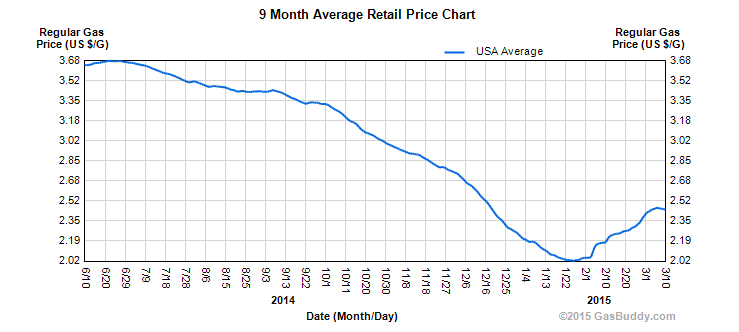On March 14, 2014, crude oil sat on the commodities market at about $100 a barrel. Average gas prices across the nation sat at about $3.40 per gallon. As of March 15, crude oil is priced at $44 a barrel and average gas prices are $2.42 a gallon. What triggered this massive drop in prices? How long will consumers be able to fuel up their car for a smile-inducing low cost?
Understanding why gas prices are so low requires understanding the basic economic law of supply and demand. It is known and understood that prices are determined by how much of a good is available for sale and how many people want to purchase that particular good. If many people want to buy something that is scarce, sellers can raise prices to make more money. If few people want something of which there is plenty, sellers must lower prices to try and sell as much as possible.
America’s economy is growing at a normal, healthy rate. In December 2014, the unemployment reached 5.5%, the lowest since 2008. Demand for fuel is normal across the states. However, Europe and Asia have experienced sharp economic downturns in the past year, meaning that their demand for gasoline has slumped. Demand in these continents grew only a fraction of a percent from January 1, 2014 to January 1, 2015. What’s more, America is a car society–everyone drives. Every person pays attention to fuel shortages and prices.
Not only is demand lower than normal, supply is higher. As “hydraulic fracturing” (the controversial process known as “fracking”) has become legalised in many states, it is now possible to access the vast oil fields of states like North Dakota. This has caused the amount of oil on the international market to go up dramatically.
One might expect that OPEC (a union of oil exporters)in the middle east would slow production in response to this, but they have instead decided to lower their own prices to sell oil cheaper than the United States. It costs a pretty penny to import oil halfway across the world, but it is also expensive to extract oil from beneath hard shale and tar sand using hydraulic fracturing. Therefore, OPEC has managed to sell gas at a cheaper price than the United States while still making profits for their countries.
In addition, Libyan production has more or less returned in full force since the fall of dictator Muammar Gaddafi. While Islamic rebel forces (known as the “Libyan Dawn”, who have gone so far as to take control of the city of Tripoli) still fight against the U.N.-backed government on a daily basis, most oil rigs are producing oil for the National Oil Co., which is owned and operated by the government.
Alas, not everyone comes out a winner when gas prices sink. If less oil is being consumed, then companies won’t need to extract as much. This comes as bad news for those who work in the oil industry as laborers. Oil drilling is primarily a minimum-wage job, and many laborers might not have a way to get some money and work if they lose their livelihood. Many of these laborers work in Texas, the largest oil-producing state in the US. While most fear the incoming rush of oil that will hurt the state’s economy, nothing the magnitude of the 1980’s oil bust is feasible. Texas has expanded its economy into different industries since that time, and is no longer solely supported by oil.
Also hit is the North Carolina Department of Transportation, whose primary source of funding is a tax placed on fuel at the pump. This gas tax has always been determined by a simple formula. But with gas prices falling so low and the DOT possibly facing a budget shortfall, a bill has been passed around the North Carolina state senate to make the tax freeze at a minimum of 35 cents on the gallon. North carolina is ranked 6th in the nation in taxing gas. (The tax on gas in South Carolina is only 16.75 cents a gallon as of march 12, compared to 37.35 cents in North Carolina)
“I think [the price of gas] is good. I mean, it helps me save money. Then I have money for other stuff,” said Adrian Pierce Brown, a junior.
“Don’t buy a car that takes premium if you work at Harris Teeter,” jokes Will Thrower, also a junior. It just goes to show that unless anyone can manage to turn water into oil, there will always be someone feeling strained by gas prices.

Leave a Reply